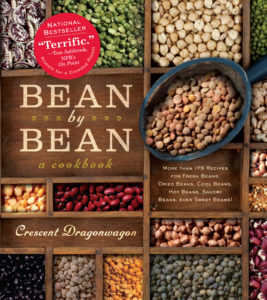 Beans: They’re magical! Not only are they delicious, but they have many health-giving properties, and their numerous varieties can be put to a seemingly infinite number of uses.
Beans: They’re magical! Not only are they delicious, but they have many health-giving properties, and their numerous varieties can be put to a seemingly infinite number of uses.
Crescent Dragonwagon is the author of numerous highly successful cookbooks, including Passionate Vegetarian. Her latest, Bean by Bean: A Cookbook, celebrates all things leguminous, and is chock-full of scrumptious recipes and fascinating facts. Below, 10 interesting things you probably didn’t know about beans!
- Beans are the only cultivated plants that actually enrich, rather than deplete, the soil during the growing process. How is this possible? Legumes have nodules on their roots that add nitrogen to the soil instead of using it up.
- Cooked beans can be frozen for up to six months. Thaw them overnight in the fridge before reheating.
- Bean carbohydrates have been proven to drastically improve the stability of blood sugar levels in diabetics. Many adult-onset diabetics have been able to greatly reduce or eliminate their dependence on insulin through diets containing substantial amounts of beans.
- In ancient Rome, so esteemed were legumes that the four leading families took their names from them: Lentullus (lentil), Piso (pea), Cicero (chickpea), and Fabius (fava).
- India, Canada, Turkey, Australia, Nepal, the United States, Bangladesh, and China are the world’s top lentil producers.
- Beans, their kin, and the products made from them—such as tofu and tempeh—are the most concentrated source of plant-based protein in the world. Between 6 and 11 percent of a cooked bean’s weight is protein.
- Some ancient cults who believed in reincarnation, most notably the monastic followers of Pythagoras, thought human souls traveled through the stems of bean plants to Hades, where they were then transmogrified for their next lives; it was therefore a sin to eat beans or even walk among bean plants.
- The mischief-maker behind the bean’s reputation as a musical fruit is a group of complex sugars called oligosaccharides. Oligosaccharides cannot be broken down by our digestive enzymes; instead, our intestinal bacteria ferment them during digestion, causing most of the gas attributable to beans. Luckily, it’s possible to mitigate the gas-making effects of beans through controlling factors such as cooking method and duration, complementary ingredients, and the variety of bean used. (The least “flatulating” legumes are said to be lentils, split peas, adzuki beans, mung beans, and black-eyed peas.)
- A 1907 resolution introduced by Minnesota Senator Knute Nelson states that while the Senate is in session, bean soup must be served daily, regardless of the weather.
- In terms of sheer numbers and staggering diversity, no part of the world comes close to matching the abundance and variety of beans available in America: kidney and black beans, navy and cranberry, lima, white runner, scarlet runner, brown tepary and white tepary, calico, eye-of-the-goat, nightfall, fresh green beans, and more!
Crescent Dragonwagon is a writer and food enthusiast who lives on a farm in Vermont. You can follow her on Twitter @CDragonwagon. Bean by Bean is available for purchase online and in a bookstore near you.





4 Comments
Pirkti internetu
November 22, 2014 at 7:14 pmI just added this blog to my feed reader, great stuff. Can not get enough!
james
June 8, 2015 at 9:31 ambeans are cool
Ashley
September 3, 2015 at 9:21 pmI had an assignment to find 10 cool facts about beans and it seemed like the dumbest and most boring thing i had to do but when i read this is was so cool and beans are amazing!!!!!!!!!!!!!!!
Various Kinds of Beans – foodsofallkinds
July 3, 2018 at 1:46 pm[…] 10 Fascinating Bean Facts from Crescent Dragonwagon’s BEAN BY BEAN blog.workman.com “Beans: They’re magical! Not only are they delicious, but they have many health-giving properties, and their numerous varieties can be put to a seemingly infinite number of uses… […]